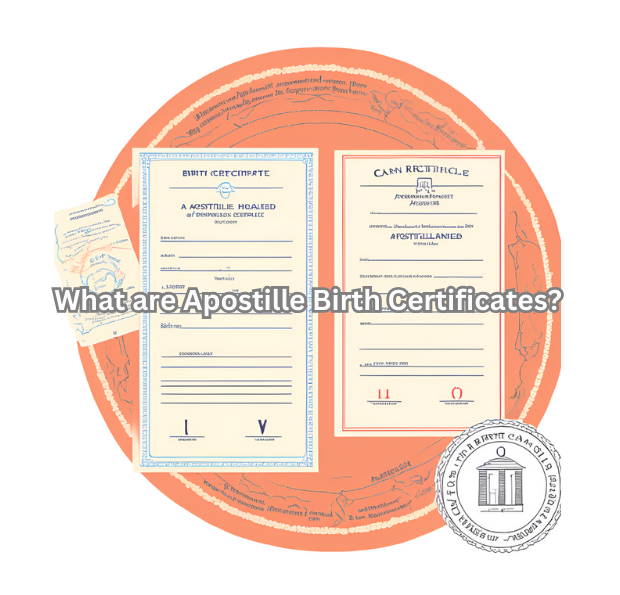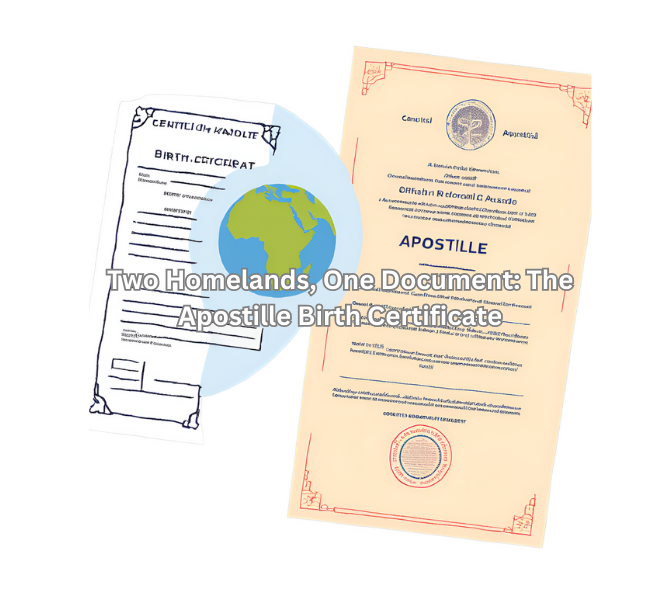In our interconnected and globalized world, the discussion on apostille birth certificates and dual citizenship is timely. Many people are considering dual citizenship for various reasons such as access to better job opportunities, increased mobility, education, or even cultural enrichment; globalization also yielded a generation of an increased amount of mixed individuals who have two countries of ancestry, and often, they seek citizenship from both countries. The apostille birth certificate is an essential document in the process of dual citizenship.

What are Apostille Birth Certificates?
An apostille birth certificate is an authenticated copy of the original birth certificate, validated by an apostille stamp. This globally recognized accreditation process originated from the 1961 Hague Convention, abolishing the requirement of legalization for foreign public documents. What differentiates an apostille birth certificate from a regular birth certificate is the unique apostille stamp, which is internationally recognized and affirms the document’s authenticity.
The importance and utility of apostille birth certificates extend far beyond just acknowledgment of birth. They often serve as a critical legal document in international dealings and procedures, including but not limited to, applying for dual citizenship, international adoption, marriage, acquiring overseas education or work, or doing business internationally. However, to obtain an apostille birth certificate, one must go through a specific procedure, governed by the laws in respective countries. Understanding this process could prove vital when dealing with international legalities.
Dual Citizenship: An Overview
When an individual is a citizen of two countries simultaneously, they are said to hold dual citizenship. This can happen in several ways, including birth, marriage, descent, or naturalization. For instance, a child born to foreign parents in a country that follows jus soli (right of the soil), like the US and Canada, automatically receives citizenship of both the child’s parents’ home country and the birth country.
Dual citizenship has many potential benefits. It can offer greater economic freedom and security, better job and education opportunities, and wider travel possibilities. For instance, EU citizenship allows one the right to live, work, or study anywhere in the European Union. Dual citizens also enjoy all the rights and privileges of the two nations of which they are citizens. However, they must also fulfill the responsibilities and obligations of those countries, such as taxes and national service. Various countries globally allow dual citizenship, like the United States, the United Kingdom, Australia, Canada, France, Portugal, and many others.
Role of Apostille Birth Certificates in Dual Citizenship
Regardless of the route that one takes on their journey to dual citizenship – whether it’s through marriage, naturalization, or descent – proving one’s nationality, identity, and age is a fundamental requirement; this is why an apostille birth certificate is important. This authenticated and legally certified document is widely accepted in all Hague Convention participating countries, making it a critical legal document in the application process for dual citizenship.
Specific circumstances necessitate the presentation of an apostille birth certificate. For instance, if a child born to parents of different nationalities seeks dual citizenship, an apostille birth certificate may be required as proof of parentage and nationality in certain countries. Likewise, countries that allow for dual citizenship through descent might also require an apostille birth certificate as proof of the individual’s lineage. The apostille birth certificate lies in its international recognition, allowing such important processes to take place relatively seamlessly across numerous countries with various legal differences.
How to Acquire an Apostille Birth Certificate
Obtaining an birth certificate involves several steps that vary depending on the specific requirements of your country of origin. The generalized process usually begins with procuring an official copy of your birth certificate from the local government body. Once you’ve received your formal birth certificate, you’ll need to request its apostille authentication. In the United States, for instance, this is typically facilitated through the Secretary of State or other designated government bodies. You should check with the authority in your specific state or country for detailed instructions. Usually, after obtaining a birth certificate, you must send your original birth certificate, along with a completed application form and a transaction fee, to the chosen department.
If you’re overseas, you might need to contact the local embassy or consulate of your birth country to help you with the authentication. In some cases, local notaries or solicitors might authenticate the document before a senior official part of a Hague Convention affixes the apostille. Keep in mind that you may also need to translate your birth certificate if the country you’re applying for dual citizenship requires it. It is strongly advised to check for specific requirements, as procedures vary by country, and any errors could impede the authentication process and delay your dual citizenship application.
Conclusion
An apostille birth certificate can greatly aid the process of dual citizenship and obtaining international work. As you contemplate obtaining one, remember that obtaining dual citizenship is not simply an administrative process but a decision with significant personal and lawful implications. Knowing the integral role an apostille birth certificate plays, take the time to assess whether dual citizenship aligns with your aspirations, lifestyle, and long-term goals. For those who embrace the idea of cultural enrichment, increased travel freedom, or better job opportunities brought about by dual citizenship, the apostille birth certificate stands to be your trusted companion along the way.
